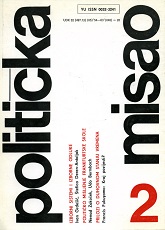Metapolis i apolitie - Deficiti percipiranja političkoga u kritičkoj teoriji Jürgena Habermasa
Metapolis and Apolitie - Deficiencies in the Perception of the Political in the Critical Theory of Jürgen Habermas
Author(s): Ernst VollrathSubject(s): Political Philosophy, Political Sciences, Politics and communication, Theory of Communication
Published by: Fakultet političkih znanosti u Zagrebu
Keywords: Metapolis and Apolitie; Deficiencies in the Perception; Political; Critical Theory; Jürgen Habermas;
Summary/Abstract: Critical Theory hit its origins in the milieu of the theory of crisis and of the criticism of culture after World War I. This critique is an apolitical attitude of those two in the face of real or purported damages suffered by society which they were unwilling or unable to remove. Cultural criticism was particularly fruitfully accepted and elaborated in the German cultural circles, especially within the framework of the Frankfurt »Institute for Social Research« which brought together a group of left-oriented intellectuals who wished and intended to distance themselves from involvement in publics both in practical and in theoretical terms. The thought of Jurgen Habermas stands in a complex and complicated relationship towards critical theory. That thought lacks an approach to the political and to its self-standing wisdom. We are dealing there with a paradigm of an anarchism supported by moral reflectiveness which only tries to transcend the real political character of -politics- in a met apolitical manner.
Journal: Politička Misao
- Issue Year: XXVII/1990
- Issue No: 02
- Page Range: 92-114
- Page Count: 23
- Language: Croatian

